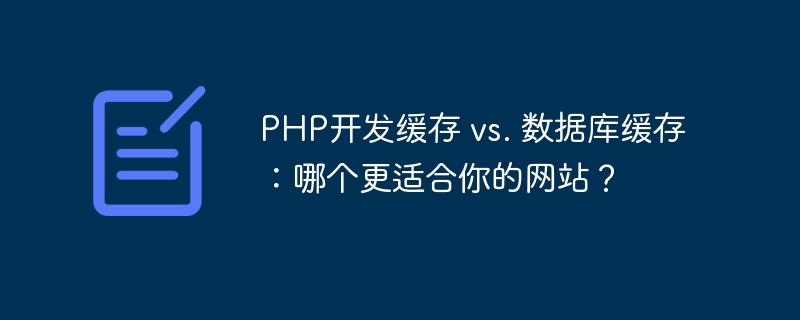

In web development, caching is one of the important means to improve website performance and response speed. In caching technology, PHP development caching and database caching are two commonly used methods. So, which method is more suitable for your website? This article will analyze and compare the principles, advantages, disadvantages and code examples.
1. Principle
PHP development cache refers to caching PHP code into memory at runtime to improve Web applications A technology for access speed. When a PHP script is run for the first time, its compiled results will be cached in memory. When the same script is requested next time, there is no need to recompile, but the compiled code is taken out of the memory and executed.
Database caching refers to caching query results or commonly used data into memory to reduce the number of accesses to the database, thereby improving query speed and performance .
2. Advantages
(1) Improve website response speed: Because PHP development cache caches the compilation results into memory In each request, the compiled results are obtained directly from the memory, avoiding frequent compilation and greatly improving the access speed of the website.
(2) Reduce server load: Since PHP development caching reduces the load on the server CPU, it can reduce the load on the server and improve the concurrent processing capability of the website.
(3) Improve website stability: Since PHP development caching reduces the load on the server, it can effectively prevent the server from crashing due to excessive pressure, and reduces network traffic, which can greatly reduce the risk of the server hanging up. .
(4) Good scalability: PHP development cache can be expanded into a distributed PHP cache, which distributes the cached data among multiple servers to improve the scalability and stability of the application.
(1) Improve query speed: Since the database cache caches the query results into the memory, there is no need to access the database again during the query, which is greatly improved improve query speed.
(2) Reduce database access: Since the database cache can cache commonly used data into memory, it can reduce access to the database and avoid frequent database I/O operations, thus reducing the burden on the database.
(3) Improve website stability: Due to reduced access to the database, the burden on the database can be reduced, the delay in database access can be reduced, and the stability of the website can be improved.
(4) Higher data reliability: Since the database cache can improve the reliability of the data to the extreme, even if the data is abnormal, it can be quickly restored through backup.
3. Disadvantages
(1) Occupying memory resources: Because PHP development cache needs to cache the compilation results into memory , so it needs to occupy a certain amount of memory resources. If there is too much cache, it may cause insufficient memory on the server.
(2) Cache invalidation problem: Since the PHP development cache caches code, if the code is updated, you need to manually clear the cache or wait for the cache to expire.
(3) For scripts that have not been used for a long time, the PHP development cache will become invalid and need to be reloaded, which will cause certain performance consumption.
(1) Occupying memory resources: Since database caching needs to cache query results or commonly used data into memory, it needs to occupy a certain amount of memory. resources, if cached too much, it may cause the server to run out of memory.
(2) Data consistency issues: Since the cached data is not real-time, there may be issues with data consistency that need to be addressed by developers.
(3) Cache invalidation problem: Since the database cache caches query results or data, if the data is updated, you need to manually clear the cache or wait for the cache to expire.
4. Code examples
Example 1:
<?php
//启用缓存
$cache = new Memcache();
$cache->connect('localhost', 11211) or die ("Could not connect memcache");
$key = 'article_1';
$result = $cache->get($key);
if(!$result) {
//如果缓存中没有该值,就从数据库中取出
$result = mysql_query("SELECT * FROM article WHERE id=1");
$result = mysql_fetch_assoc($result);
//取得数据存入缓存,并设立过期时间(设为10秒钟)
$cache->set($key, $result, MEMCACHE_COMPRESSED, 10);
}
echo $result['title'];
?>Example 2:
<?php
//启用缓存
$cache = new Memcache();
$cache->connect('localhost', 11211) or die ("Could not connect memcache");
$key = md5($_SERVER['REQUEST_URI']);
$result = $cache->get($key);
if(!$result) {
//如果缓存中没有该值,就查询数据库,
$result = mysql_query("SELECT * FROM news ORDER BY id DESC LIMIT 5");
while($row = mysql_fetch_assoc($result)) {
$news_list[] = $row;
}
//取得的数据存入缓存,并设立过期时间(设为1分钟)
$cache->set($key, $news_list, MEMCACHE_COMPRESSED, 60);
}
//输出缓存中的数据
foreach($news_list as $news){
echo "<li><a href='{$news['url']}'>{$news['title']}</a></li>";
}
?>Example 1:
//使用Memcached作为缓存客户端
//启用缓存
$cache = new Memcache();
$cache->connect('localhost', 11211) or die ("Could not connect memcache");
$key = md5($_SERVER['REQUEST_URI']);
$cache_result = $cache->get($key);
if($cache_result){
$result = $cache_result;
}else{
//执行SQL查询操作
$result = mysql_query("SELECT * FROM users WHERE name='john'");
//将查询结果存入缓存,并设立过期时间(设为1小时)
$cache->set($key, $result, MEMCACHE_COMPRESSED, 3600);
}
//输出查询结果
while($row = mysql_fetch_assoc($result)){
echo "<p>{$row['id']}: {$row['name']}</p>";
}Example 2:
//使用Redis作为缓存客户端
//启用缓存
$redis = new Redis();
$redis->connect('localhost', 6379);
$key = md5($_SERVER['REQUEST_URI']);
$cache_result = $redis->get($key);
if($cache_result){
$result = json_decode($cache_result, true);
}else{
//执行SQL查询操作
$result = mysql_query("SELECT * FROM goods WHERE id=1");
while($row = mysql_fetch_assoc($result)){
$goods_info = $row;
}
//将查询结果存入缓存,并设立过期时间(设为5分钟)
$redis->setex($key, 300, json_encode($goods_info));
}
//输出查询结果
echo "<p>{$goods_info['name']}</p>";
echo "<p>{$goods_info['price']}</p>";In summary, PHP development cache and database cache Each has its own advantages and disadvantages, and in actual use, you need to choose according to the application scenario and needs. For data that changes frequently, it is recommended to use database cache; for PHP code that does not change frequently, it is recommended to use PHP development cache. At the same time, we also need to consider the issue of cache invalidation and the occupation of server resources. Through the reasonable use of caching technology, the performance and stability of the website can be greatly improved.
The above is the detailed content of PHP development caching vs. database caching: Which is better for your website?. For more information, please follow other related articles on the PHP Chinese website!